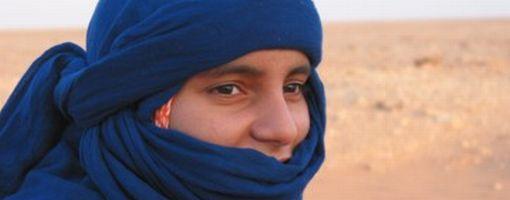
Senia Abderahman, former student at the United World Colleges in Fjaler, Norway, recounts the story of her grandmother.
Her story
The night has just worn it black coat with bright stars. My grandmother and I sit on the cold-soft dunes of the Algerian desert. She points with her fingers to the wide sky and starts to explain the Saharawi astronomy. Though she is utterly blind, she still can sense what once was a reality for her. She usually tells me stories at night, some are fairytales and others she considers real. However, on this night she was about to tell me a different kind of story, a story that does not make me fall asleep, but one that wakes me for the rest of my life. It is her story.
Asisa is a widow and a mother of three daughters. Like many women in her time, she got married at the age of twelve, but did not give birth until twenty. The fact that she did not give birth one year after getting married was a big concern amongst her family members. Yet, her husband was understanding and did not divorce her for that reason. As a mother and a wife, her day usually starts very early in the morning by milking the cattle. “Everything was green and the air was so fresh”, she compares the country side of Smara with Smara camp, where she lived for the last three decades. She went on and on telling me about the fantasies of my homeland. She remembers, the great people, who were separated by a wall bigger than the Palestinian separation wall, the beautiful nature and beaches that she will never again enjoy seeing. All the time I would interrupt with a question in an attempt to imagine where she once lived and really loved. Then, the story got twisted. She started to talk about the point that would change her life for ever.
One morning, of January 1976, something unusual happened. Before that day, Asisa heard about the Moroccan army attacking the region and forcing people to move. Nevertheless, no one in the family really paid much attention until they were victims themselves. On that day, the whole Frigg or neighborhood was forced to abandon their properties and village. "They had strange looks and indeed looked unmerciful", she describes the Moroccan solders. On that instant, her husband, my grandfather went to fight for his people. She and her three daughters and three sons had to cross the desert to seek refuge in Algeria. They had to cross on feet, no camels, cars or any other form of transportation could be used because they were afraid of airplanes dropping bombs on them. During their journey, they could only walk at night and hide behind trees or rocks during the day to take a rest. "Lala and I had to take turns watching for airplanes, while the other ones took a nap", Asisa recalls. Lala, my mother, was only twelve years old as the oldest child, while Brahim, the youngest was eight months. Three days later, they run out of food and water since they could carry limited amounts. So, they had to survive on whatever they found in the naked desert. Not long after that, unfortunately, Brahim died of dehydration. Still, they had to continue or worse could happen. Just another two days after that, while taking a break, the other two young boys died on a landmine explosion. “Half of the family was gone. It was a true devastation and heartbreaking”, she tells with tears in her eyes. The tragedy did not end here. As my tears continue to drop, she says: "and then I lost my sight". On the following day, as they continue their journey, an airplane dropped a bomb before them. Since my grandmother was in the front, some of the ashes got in her eyes and she lost her sight for ever. Nevertheless, they could not stop or else all of them die. With a smile and tears in her eyes, she says: "the next day two men came on a truck and took us to the camps." A month after they arrived the refugee camps in the southern west of the Algerian desert, she got the message of her husband's death in one of the battles.
A widow and no sight, Asisa had to take care of her three daughters in the harsh conditions of the Hamada. For me, she is the example of courage and just struggle. Despite all of that she gone through and three decades in one of the most inhospitable corners, she still hopes to go back to her homeland. “They [Moroccans] may have weapons, guns and airplanes; we [Saharawis] have patience and determination”, she always tells me. This is the story of my grandmother, which many other Saharawi women share.
Senia Abderahman, June 2007
seniaba [at] yahoo.com
Order our Western Sahara poster!
“Try to Visit Western Sahara”…
The Security Council fails Western Sahara and international law
On 31 October 2025, a new resolution was adopted in the UN Security Council calling on the Saharawis to negotiate a solution that would entail their incorporation into the occupying power, Morocco.
Saharawis Demonstrate Against Trump Proposal
The United States has proposed in a meeting of the UN Security Council on Thursday that the occupied Western Sahara be incorporated into Morocco.
Skretting Turkey misled about sustainability
Dutch-Norwegian fish feed giant admits using conflict fishmeal from occupied Western Sahara. Last month, it removed a fake sustainability claim from its website.



